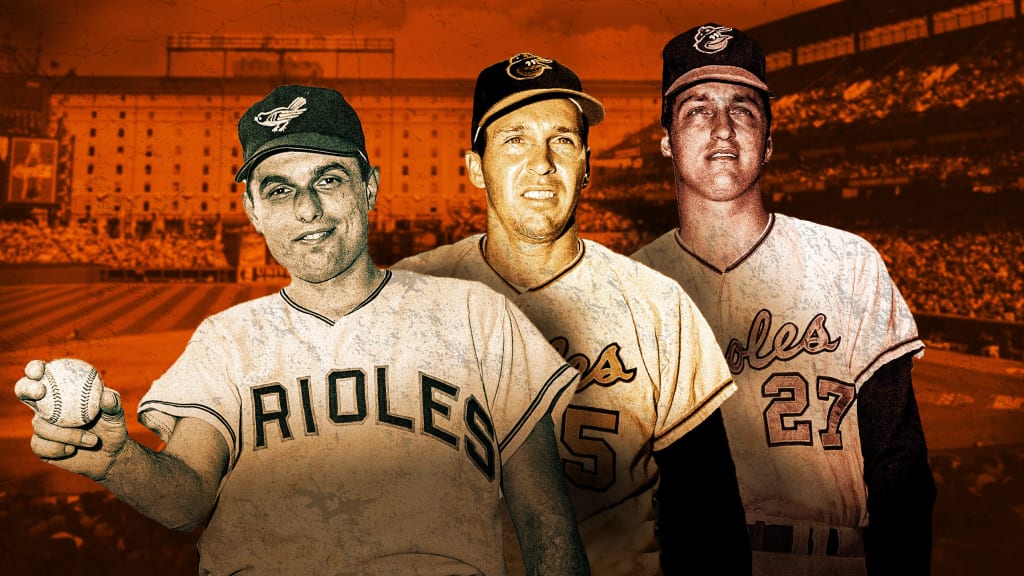
BALTIMORE -- With the likes of Adley Rutschman and Gunnar Henderson already having cracked the Majors, along with 2022 No. 1 overall pick Jackson Holliday recently having done the same, the youth movement in Baltimore is fully underway. After the Orioles turned heads by surging to a 101-win season in 2023, it's clear that this team is here to stay as a contender, with Holliday ideally sliding in as the latest piece of the puzzle.
It's far from the first time that a rapid prospect rise has happened in club history, and while the 20-year-old Holliday is still young, he¡¯s far from the youngest prospect to make a splash in the Charm City. Even Manny Machado, who debuted in 2012 as a 19-year-old, doesn¡¯t crack the top 10. The youngest Orioles to debut all come from the team¡¯s nascent days in the 1950s, when players more often -- in some cases, were required -- to bypass the Minor Leagues all together.
Those were different times. These are the youngest O¡¯s to debut in modern club history:
1. Frank Zupo
17 years, 306 days
July 1, 1957
The nine-youngest Orioles to debut in team history all come from the 1950s, when the team moved from St. Louis and took a few years to grow competitive. Their first .500 season came in ¡¯57, when Zupo debuted and earned the nickname ¡°Noodles.¡± That moniker stuck longer than Zupo¡¯s impact on the field; he appeared in just 16 games across three big league seasons. But he remains the youngest player to debut in modern Orioles history because of the ¡°baby bonus¡± rules at the time, which required amateurs signed for at least $4,000 go straight to the big leagues (they¡¯d be changed in 1965 with the first Draft). Zupo reportedly signed for $30,000 but never developed into an impact player.
2. Ron Moeller
17 years, 331 days
Sept. 8, 1956
Moeller was a can¡¯t-miss prospect coming out of Cincinnati¡¯s high school ranks and part of the Orioles¡¯ youth movement that, eventually, resulted in their 1966 world championship. But Moeller wasn¡¯t a part of it. His development stalled after being fast-tracked to the Majors in ¡¯57 and ¡¯59. He wound up pitching just one full season, for the Angels in ¡¯61, and was out of baseball by 1964.
3. George Werley
18 years, 21 days
Sept. 29, 1956
Another bonus baby pitcher, the right-handed Werley pitched one scoreless inning in relief of Moeller¡¯s first career start three weeks after his 18th birthday. A few innings later, Brooks Robinson hit the first home run of his eventual Hall of Fame career. Robinson went on to play 23 seasons. Werley never again appeared in the Majors. He remains one of the franchise¡¯s few one-inning wonders.
4. Milt Pappas
18 years, 91 days
Aug. 10, 1957
Unlike everyone above him on this list, Pappas was a bonus baby who lived up to the hype. Signed out of the Detroit high school circuit in ¡¯57, Pappas debuted later that summer and was part of Baltimore¡¯s fabled ¡°Kiddie Corps¡± rotation in 1960. He registered double-digit wins in each of the next eight seasons with Baltimore, earning All-Star nods in ¡¯62 and ¡¯65. Then came the defining moment of Pappas¡¯ career, when he was part of the December ¡¯65 trade with the Reds for Frank Robinson. Decades later, that¡¯s what Pappas remains best remembered for. But he had an accomplished career in his own right, going 209-164 with a 3.40 ERA across 17 big league seasons.
5. Bob Saverine
18 years, 102 days
Sept. 12, 1959
Appearing in one game for the Orioles as a pinch-runner in ¡¯59, Saverine didn¡¯t return to the Majors until ¡¯62, at age 21. He wound up spending parts of six seasons with the O¡¯s and Senators as a light-hitting utility man.
6. Brooks Robinson
18 years, 122 days
Sept. 17, 1955
While other teenager debuts fizzled out, Robinson¡¯s marked the beginning of a more than six-decade relationship with Baltimore and the Orioles that persists to this day. The ¡°Human Vacuum Cleaner¡± was an 18-year-old from Little Rock, Ark. when he debuted down the stretch in ¡¯55, appearing in six games that September. His first full season came in ¡¯58. By ¡¯60, the 23-year-old Robinson was an All-Star, on his way toward an inner-circle Hall of Famer career. He¡¯s still widely considered the best fielding third baseman of all time.
7. Jerry Walker
18 years, 144 days
July 6, 1957
Walker was 20 when he set an Orioles record that will never be broken, earning a 16-inning complete game shutout down the stretch in ¡¯59, against the White Sox. It¡¯s still tied for the third-longest game pitched in modern baseball history, and probably a precursor to the arm trouble that would stall Walker¡¯s career in the years to come. Two years earlier, he debuted at the ripe age of 18, fresh out of Oklahoma.
8. Wayne Causey
18 years, 161 days
June 5, 1955
A Louisiana native, Causey played parts of three seasons with the Orioles as a light-hitting teenage infielder. He resurfaced in 1961 with the Kansas City Athletics and enjoyed several productive seasons, earning down-ballot MVP votes in ¡¯63 and ¡¯64. He played through 1968, appearing for the O¡¯s, A¡¯s, White Sox, Angels and Braves.
9. Roger Marquis
18 years, 173 days
Sept. 25, 1955
Marquis played one inning in right field and grounded out in his only at bat on the last day of the 1955 regular season -- and that was it. He never appeared in the Majors again and was out of baseball by the turn of the decade.
10. Wally Bunker
18 years, 247 days
Sept. 29, 1963
Of the youngest players to debut in O¡¯s history, Bunker enjoyed the most immediate success. The right-hander made one start down the stretch in ¡¯63, then went 19-5 with 2.69 ERA in 29 starts in ¡¯64 as a 19-year-old. He finished second in AL Rookie of the Year voting that year and won at least 10 games in three of the next five seasons.
